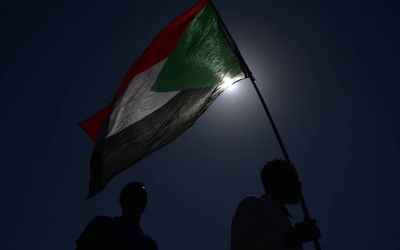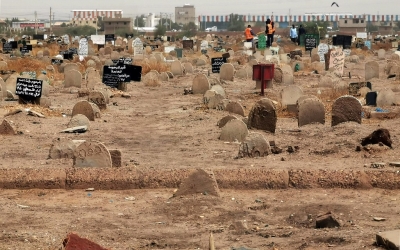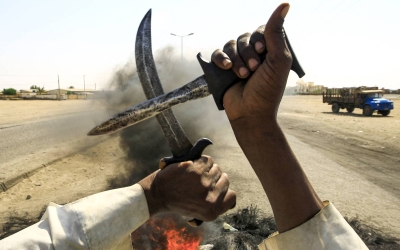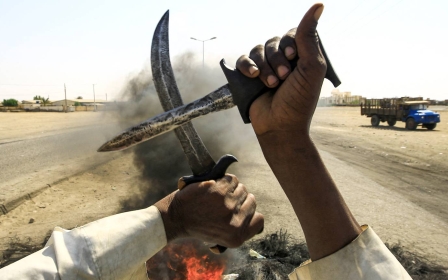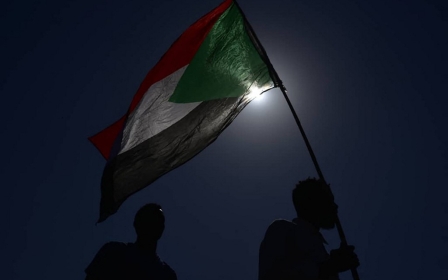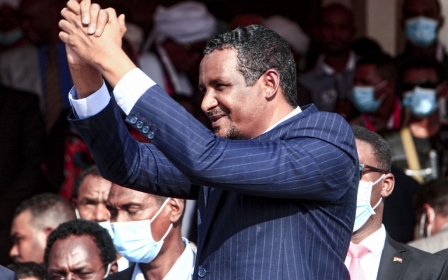Sudan coup 2021: What is happening?
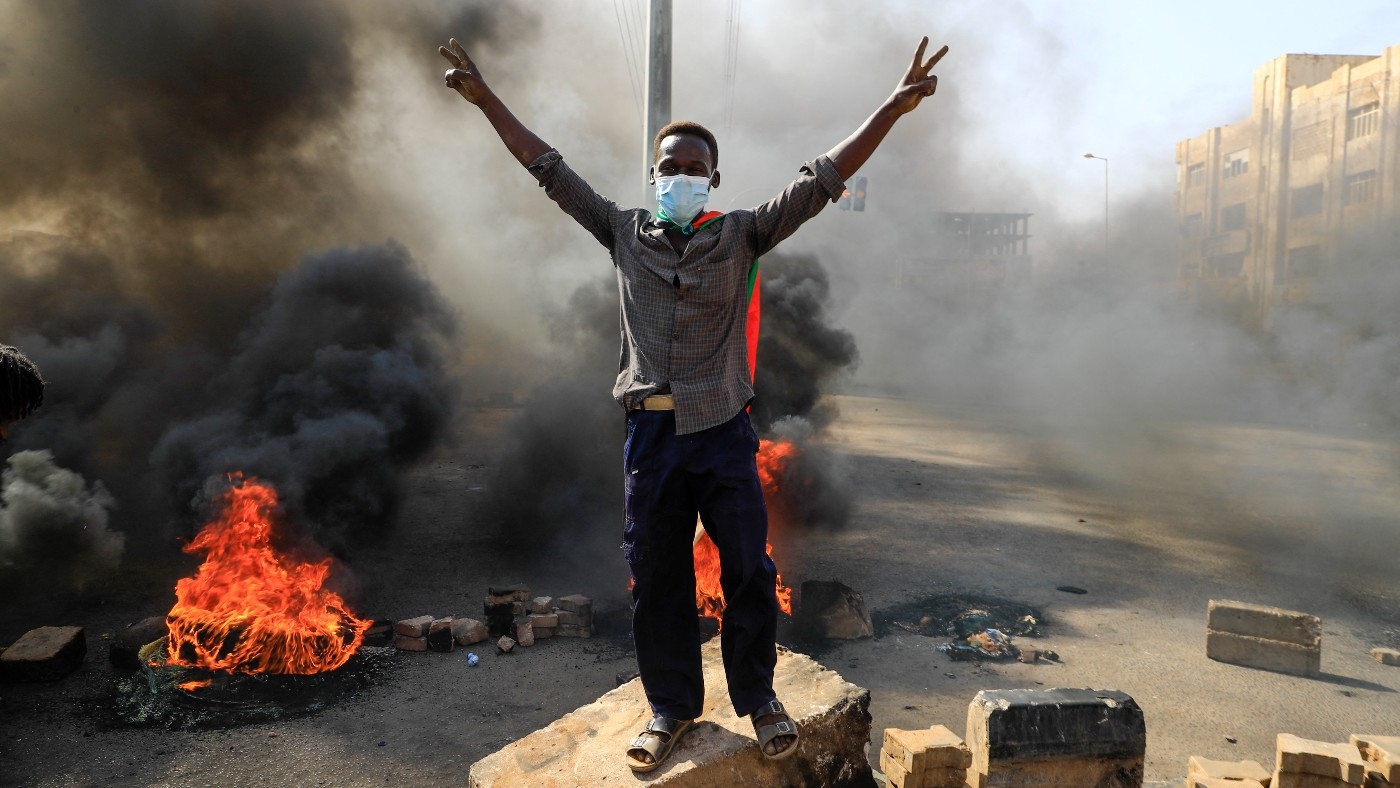
Sudan has been caught once again in turmoil on Monday following a military coup against the country’s civilian leadership, the latest threat to the country’s fragile democratic transition two-and-a-half years after a popular uprising unseated longstanding ruler Omar al-Bashir.
Middle East Eye answers your questions on the developing situation, as well as the tensions that have built up in the country since 2019, leading to the latest events.
New MEE newsletter: Jerusalem Dispatch
Sign up to get the latest insights and analysis on Israel-Palestine, alongside Turkey Unpacked and other MEE newsletters
What is happening in Sudan right now?
In the early hours of Monday, Sudanese armed forces arrested five ministers from the transitional cabinet, including Prime Minister Abdalla Hamdok.
Later in the day, General Abdel Fattah al-Burhan - the head of the army and chairman of the Transitional Sovereign Council (TSC) - declared a state of emergency across the country, and announced the dissolution of the TSC and the government.
Burhan said he will form a "competent" government that will rule Sudan until elections in July 2023, vowing that the army will lead the country until a civilian government is elected.
Hamdok issued a statement from detention, saying that the moves by the military represent a "complete coup d'etat" and called on the Sudanese people to take to the streets to defend their revolution peacefully.
He added that the military forces that kidnapped him and his wife from their home had taken them to an undisclosed location.
The African Union has since suspended Sudan’s membership, and several international powers have condemned the move and called for Hamdok’s release and the resumption of the democratic transition.
Meanwhile, internet services have been "severely disrupted" across the country since the morning.
Why was there a transitional government in the first place?
Bashir was toppled from power in April 2019 following four months of mass popular protests against his nearly 30 years of rule.
Having come to power through a military coup in 1989, Bashir was known for holding on to his leadership through a strict Islamist government and by fostering alliances with violent paramilitary groups used to suppress dissent in various regions of the vast country.
In 2009, Bashir became the first sitting head of state to be indicted by the International Criminal Court. He was charged with committing war crimes, genocide, and crimes against humanity during the conflict in Darfur, the region in western Sudan where an estimated 300,000 people were killed and millions displaced from 2003 onwards.
Sudanese authorities indicated a few months ago that they were willing to extradite Bashir to The Hague alongside other wanted officials. But the former ruler remains detained in Kobar prison in Khartoum on a two-year prison sentence after he was convicted of corruption in December.
Meanwhile, the Janjaweed militia - the infamous “devils on horseback" accused of genocide in Darfur - have since rebranded as the Rapid Support Forces (RSF) paramilitary group. RSF head Mohamed Hamdan Dagalo, widely known as Hemeti, served as Transitional Sovereign Council deputy chairman until it was dissolved by Burhan on Monday - a potent symbol of the ties of some military leaders with the former Bashir regime.
What has the post-Bashir transition looked like?
Following Bashir’s ousting, the country was led for four months by a de facto transitional military council headed by Hemeti, sparking weeks of protests by thousands outside the army headquarters in Khartoum who called for a civilian government.
Armed forces violently repressed the demonstrators, culminating in the massacre of at least 100 protesters on 3 June 2019, for which there has yet to be accountability.
Following an intervention by the African Union, civilian and armed leaders reached an agreement in August 2019 and created the Transitional Sovereign Council, theoretically paving the way for a transition to full civilian governance by 2022.
The Council is made up of five civilians chosen by the leading organisations of the anti-Bashir movement, five military representatives, and a chairperson alternating between the two factions.
The lineup of a civilian-led cabinet, headed by Hamdok since 21 August 2019, is meanwhile subject to the approval of the TSC.
The 2019 constitutional declaration paved the way for Burhan to lead the sovereign council - making him the head of state - for 21 months. So he should have handed over the seat to a civilian representative back in May, but he remained in his role.
Did this coup come out of nowhere?
No. Tensions between the civilian representatives of the anti-Bashir uprising and the military have existed ever since 2019, and have regularly threatened the fragile transition to democracy in the country.
Over the past two years, the civilian movement has regularly accused the army and other paramilitary groups of continuing to support Bashir and deliberately undermining the transition in governance.
In March 2020, Hamdok survived an attempted assassination attempt blamed on Bashir supporters.
Most recently, Khartoum saw a failed coup on 21 September, which Hamdok blamed at the time on former members of the Bashir regime with support from associates of the “deep state” from inside and outside the military.
The military rejected his accusations, claiming it had been crucial in thwarting the attempted coup, and instead accused the civilian leadership of seeking “to sow discord in the armed forces".
In recent weeks, Burhan had called for the dissolution of the civilian government led by Hamdok, arguing that the move would resolve the current political deadlock in the country. Meanwhile, the country’s security services issued a travel ban on several civilian officials.
Barely a month after an attempted coup in which the army denied involvement, the military is now open in its efforts to unseat the civilian branch of governance.
Where do the Sudanese stand?
It’s not possible to make an overarching statement about the political views of the country’s entire population, but the civilian and military branches enjoy varying degrees of support from the people.
On 16 October, thousands of supporters of the military and former members of regional rebel groups began a sit-in near the presidential palace calling for the dissolution of the civilian-led cabinet. They accused the civilian factions of delays in implementing the Juba peace agreement, signed in 2020 between the transitional government and the country’s many warring factions.
Meanwhile, pro-military protesters in eastern Sudan have shut down ports and blockaded roads over their own dissatisfaction with the Juba agreement, affecting the supply and distribution of food, bread, fuel and other materials to the rest of the country.
In response, tens of thousands of people marched last Thursday in opposition to the pro-military demonstrations, accusing the army of staging a large-scale disinformation campaign to undermine the civilian leadership.
Since news of Hamdok’s arrest on Monday morning, protesters have blocked roads in Khartoum despite facing gunfire, chanting one of the slogans of the 2019 uprising: “Freedom, peace and justice.”
The strength of popular mobilisation may play a role in how the situation develops in coming days and weeks.
Last week, Suliman Baldo, a senior researcher for the US-based Enough Project, told Middle East Eye that while “current tensions represent a serious risk to the transition”, the continued willingness of Sudanese protesters to take to the streets remained the strongest asset of the pro-democratic movement.
Middle East Eye delivers independent and unrivalled coverage and analysis of the Middle East, North Africa and beyond. To learn more about republishing this content and the associated fees, please fill out this form. More about MEE can be found here.


